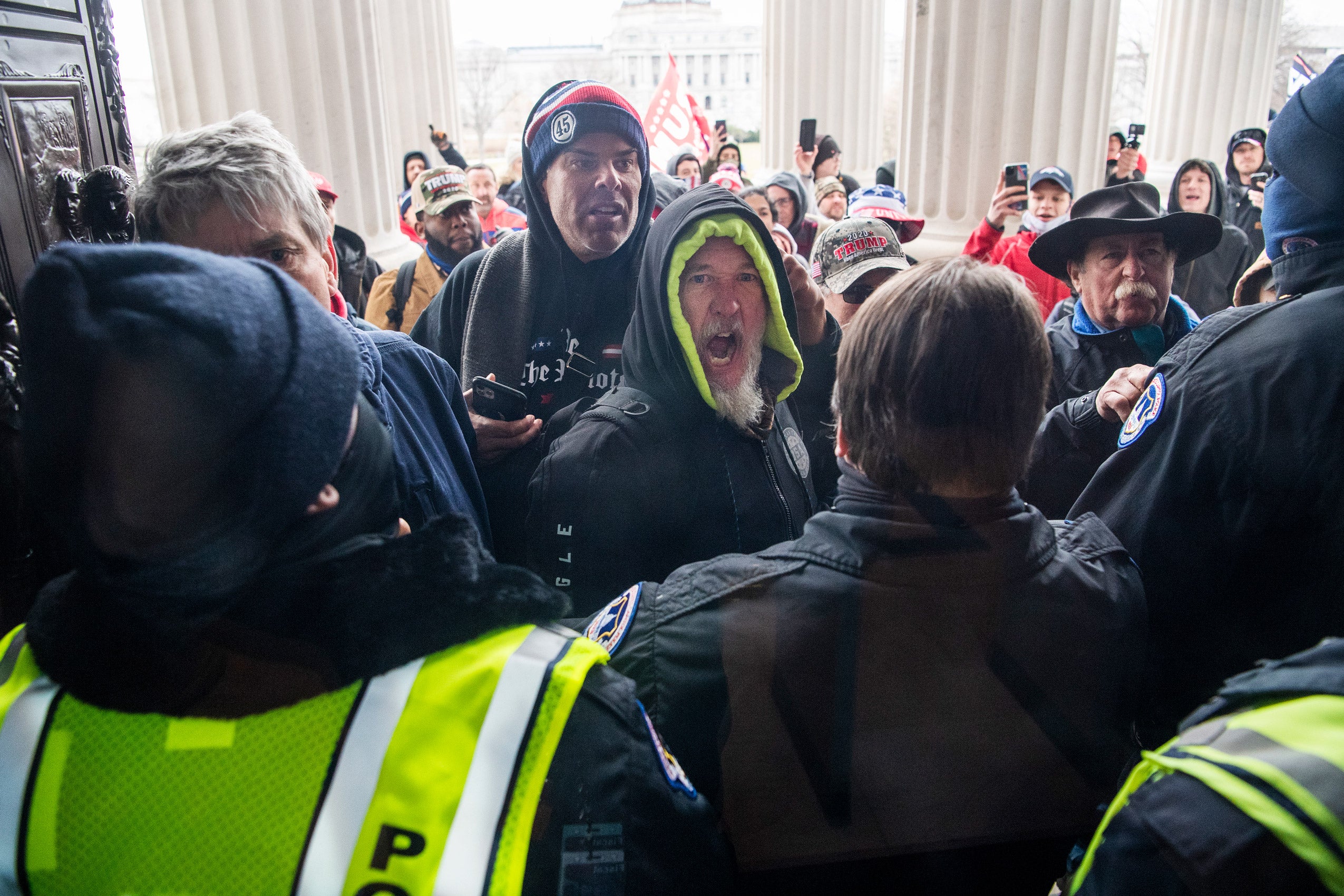People
James Tierney
-
Police in New Jersey’s Capital Violate Residents’ Rights, U.S. Finds
November 22, 2024
Police officers in Trenton, N.J., systematically violate the constitutional rights of the city’s residents, conduct illegal searches and needlessly escalate peaceful interactions into violence, the…
-
Democratic state leaders prepare for a tougher time countering Trump in his second term
November 13, 2024
Democratic governors and state attorneys general are dusting off the playbooks from their offices’ pushback against President-elect Donald Trump’s policies, but they know it could…
-
State attorneys-general are shaping national policy
February 12, 2024
To foreigners looking in, it is unusual enough that America elects most of its top prosecutors. More shocking is the amount of money going into…
-
Top law enforcement officers in red and blue states are leaning on never-before-tested legal strategies to probe the boundaries of reproductive restrictions nationwide since the…
-
Republicans Find Home Court for Biden Suits in Western Louisiana
December 20, 2022
Conservative states jointly challenging the Biden administration have found their preferred venue and, within it, an ideal judge in a rural Louisiana farming parish where,…
-
Longest-Ever Serving State Attorney General Defeated in Iowa (2)
November 10, 2022
Iowa Democrat Tom Miller, the longest-ever serving state attorney general who took on everyone from Big Tobacco to Microsoft Corp. and Alphabet Inc.’s Google, was…
-
The attorney general’s race rarely grabs front-page headlines — but experts and advocates across the political spectrum say the position is one of the most…
-
At 66, Elizabeth Strout Has Reached Maximum Productivity
September 6, 2022
Elizabeth Strout didn’t bat an eyelash when I admitted, moments after meeting her, that I’d snapped the handle off the toilet in her agent’s bathroom.
-
With Mass. attorney general Democratic primary down to two, crucial question emerges: Who is more qualified?
September 6, 2022
To be the attorney general of Massachusetts, the “people’s lawyer” as the position is sometimes called, does it matter how much and what type of…
-
As the country grapples with states’ newfound power to regulate abortion in the aftermath of this summer’s U.S. Supreme Court decision, state attorney general candidates…
-
State Attorneys General Unite Against Robocalls
August 29, 2022
Nothing has been able to kill scam robocalls — not federal regulation, not individual state lawsuits, not private software. Each effort has made a dent,…
-
Under Maura Healey, the attorney general’s office sued the Trump administration nearly 100 times. Most of the time, she prevailed.
August 16, 2022
Donald Trump hadn’t even taken office before Attorney General Maura Healey vowed to fight him in court. In a November 2016 fund-raising appeal to supporters,…
-
Harvard Law lecturer and former Maine attorney general Jim Tierney wants to demystify the inner workings of the state attorney general's office with a 'living text' to help students better understand this definitively American structure.
-
How State AGs Became a Check on the President
September 30, 2021
As soon as President Biden announced his plan to require large employers to mandate vaccines, Republicans vowed to block him. “I will pursue every legal option available to the state of Georgia to stop this blatantly unlawful overreach by the Biden administration,” tweeted Gov. Brian Kemp. ...They vowed to block it, although they have to wait for the federal rule to be finalized before going to court. “This is a serious and coordinated effort,” says Jim Tierney, who directs a clinic on attorneys general at Harvard Law School. “This cannot possibly be a surprise to the Biden administration.”
-
Did implicit bias lead to breach of U.S. Capitol?
January 8, 2021
Harvard Law School’s James Tierney says police would have treated Black Lives Matter protesters differently.
-
As Covid cases soar, GOP state lawmakers keep fighting to limit governors’ power to respond
November 16, 2020
Coronavirus cases have surged to their highest levels yet, but conservative state legislators across the U.S. are fighting to limit governors’ ability to impose public health restrictions — and have succeeded in two states with rising caseloads in the heaviest hit region of the country. In public health emergencies, governors have broad powers to impose quarantines and other actions to stop the spread of disease. As emergency orders have stretched on for months, state lawmakers around the country have objected to what they say is governors’ unprecedented use of power for such an extended period of time. The efforts to limit their power have targeted governors across party lines, but those that have had the most success have been in states with Democratic governors and Republican-controlled legislatures...With more states imposing restrictions again to combat rapidly rising case rates, the number of challenges is only likely to increase. “As time has gone on, there's been Covid fatigue, and that’s resulted in more legal challenges,” said James Tierney, a Harvard Law School lecturer and director of its attorney general clinic. “Unfortunately, a lot of public health issues have become political and not scientific in the last three or four months.”
-
State attorneys general have sued Trump’s administration 138 times — nearly double those of Obama and Bush
November 16, 2020
During President Donald Trump's four years in office, his administration has sparred in court with state attorneys general over nearly every issue. Among the topics: the "travel ban"; the Deferred Action for Childhood Arrivals program, or DACA; family separations at the U.S.-Mexico border; the "national emergency" declaration to build the border wall; international student visas; student loan protections; clean water rules; transgender health care protections; automobile emissions; a citizenship question on the 2020 census; U.S. Postal Service operations; and Obamacare. If it seems like a lot, it is. A review of litigation against federal agencies during the Trump administration shows that state attorneys general have filed 138 multistate lawsuits since he took office...James Tierney, a Democratic former attorney general of Maine who is now a lecturer at Harvard Law School, said Trump has largely himself to blame for the flurry of lawsuits after he used executive orders and other directives to push his agenda, often bypassing Congress and administrative laws. "Depending on what President Biden does — and more importantly, how he does it — GOP AGs can be expected to sue," Tierney said. "How often and to what degree of success will depend on what President Biden actually does."
-
Election and Supreme Court Fight Will Decide Trump’s Environmental Legacy
September 28, 2020
President Trump has initiated the most aggressive environmental deregulation agenda in modern history, but as his first term drives to a close, many of his policies are being cut down by the courts — even by Republican-appointed jurists who the administration had hoped would be friendly. Those losses have actually heightened the stakes in the election and the fight over a replacement on the Supreme Court for Justice Ruth Bader Ginsburg: A second term, coupled with a 6-3 conservative majority on the high court, could save some of his biggest environmental rollbacks. Since January courts have dealt a series of blows to the Trump administration’s plans to ramp up fossil fuel development and undo decades of environmental protections. This month, a federal appeals court temporarily blocked implementation of a major rollback of methane emissions standards for the oil and gas industry while it considers permanent action... if Joseph R. Biden Jr. gets into the White House in January, he will have to provide a written explanation of the reasons he wants to roll back each Trump administration action. Eliminating Trump’s executive orders will be relatively easy, but going through the regulatory process all over again on issues like fuel efficiency...James E. Tierney, a former Maine attorney general who now teaches courses at Harvard Law School on the role of attorneys general, said that they are “institutionally designed to be independent watchdogs, independent brakes on power.” Their relative independence from executive power, whether in their own state or the federal government, goes back to the thirteen original colonies, and, before that, English common law. “If there’s a Democratic president, roll up your sleeves and wait for Texas to file lawsuits against President Biden,” he said.

